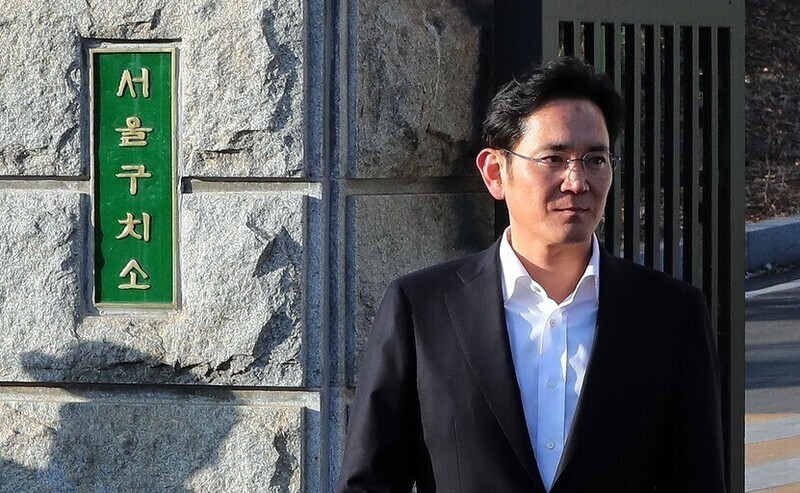hankyoreh
Links to other country sites 다른 나라 사이트 링크
Lee Jae-yong’s parole sparks controversy over preferential treatment claims

Amid criticism of the Justice Department’s decision to grant parole to Lee Jae-yong, vice chairman of Samsung Electronics, currently in prison for interfering in state affairs, it has been pointed out that less than 1% of all parolees within the past 10 years have been released without serving 70% of their prison term.
In cases such as Lee’s where there are ongoing investigations outside of the original conviction, less than 1% of inmates are granted parole.
According to the Ministry of Justice’s Correctional Statistics Yearbook 2021 released on Tuesday, in the past 10 years, 275 people were released on parole without having served 70% of their sentence, as is the case with Lee. This number accounts for a mere 0.4% of the total number of paroles granted (7,553).
In the same period, 54 people, or 0.08%, were granted parole without fulfilling 60% of their sentence. Within this category, most were conscientious objectors imprisoned for their religious beliefs.
Lee served 60% of his prison term as of July 28. Last year’s statistics alone indicate that only 0.6% of those released on parole failed to serve 70% of their sentence.
In particular, few people were granted parole while undergoing separate trials for other cases. Lee is currently charged with breaking succession laws in contravention of the Capital Market Act as well as the External Audit Act along with the violation of the Narcotics Control Act for allegedly abusing propofol.
According to a Justice Ministry official, 67 people in total were granted parole last year while being investigated or standing trial for offenses outside of those related to their prison sentence.
That figure represents 0.85% of the total number (7,876) of parolees last year. The figure is expected to be lower for petitioners like Lee, who had not served 70% of their sentences.
Kim Jeong-bum, a parole lawyer, said, “I know of a case where a first-time offender after having served 79% of his sentence applied for parole and was rejected [for release on coming Sunday].”
“In cases where a parole applicant is the subject of ongoing investigations or on trial for offenses unrelated to their prison term, parole may be possible if the expected punishment for such offenses is a simple fine, for example, traffic law violations,” Kim added. “However, it is unprecedented for Vice Chairman Lee to be granted parole when he is under suspicion for illegal succession, which has the possibility of resulting in a serious sentence.”
Legal experts say that it is likely that if Lee resumes his management role after parole, his other two trials will probably be prolonged. Lee may go on business trips abroad to ostensibly resolve a backlog of management tasks.
If allowed to travel, his trials may be further delayed. Some have said that an extended trial would favor Lee.
One lawyer said, “From the prosecution’s point of view, a long trial may result in personnel changes which would make any indictment difficult for a prosecutor. It’s even possible that the prosecutor in charge may quit.”
By Jeon Gwang-joon, staff reporter
Please direct comments or questions to [english@hani.co.kr]

Editorial・opinion
![[Guest essay] Preventing Korean Peninsula from becoming front line of new cold war [Guest essay] Preventing Korean Peninsula from becoming front line of new cold war](https://flexible.img.hani.co.kr/flexible/normal/500/300/imgdb/original/2024/0507/7217150679227807.jpg) [Guest essay] Preventing Korean Peninsula from becoming front line of new cold war
[Guest essay] Preventing Korean Peninsula from becoming front line of new cold war![[Column] The state is back — but is it in business? [Column] The state is back — but is it in business?](https://flexible.img.hani.co.kr/flexible/normal/500/300/imgdb/original/2024/0506/8217149564092725.jpg) [Column] The state is back — but is it in business?
[Column] The state is back — but is it in business?- [Column] Life on our Trisolaris
- [Editorial] Penalties for airing allegations against Korea’s first lady endanger free press
- [Editorial] Yoon must halt procurement of SM-3 interceptor missiles
- [Guest essay] Maybe Korea’s rapid population decline is an opportunity, not a crisis
- [Column] Can Yoon steer diplomacy with Russia, China back on track?
- [Column] Season 2 of special prosecutor probe may be coming to Korea soon
- [Column] Park Geun-hye déjà vu in Yoon Suk-yeol
- [Editorial] New weight of N. Korea’s nuclear threats makes dialogue all the more urgent
Most viewed articles
- 1[Guest essay] Preventing Korean Peninsula from becoming front line of new cold war
- 2Yoon’s broken-compass diplomacy is steering Korea into serving US, Japanese interests
- 360% of young Koreans see no need to have kids after marriage
- 4[Reporter’s notebook] In Min’s world, she’s the artist — and NewJeans is her art
- 5After 2 years in office, Yoon’s promises of fairness, common sense ring hollow
- 6S. Korean first lady likely to face questioning by prosecutors over Dior handbag scandal
- 7[Column] Why Korea’s hard right is fated to lose
- 8AI is catching up with humans at a ‘shocking’ rate
- 9[Column] The first year of war in Ukraine
- 10‘Weddingflation’ breaks the bank for Korean couples-to-be